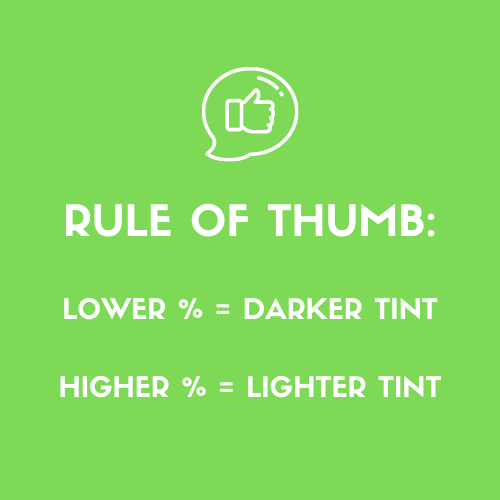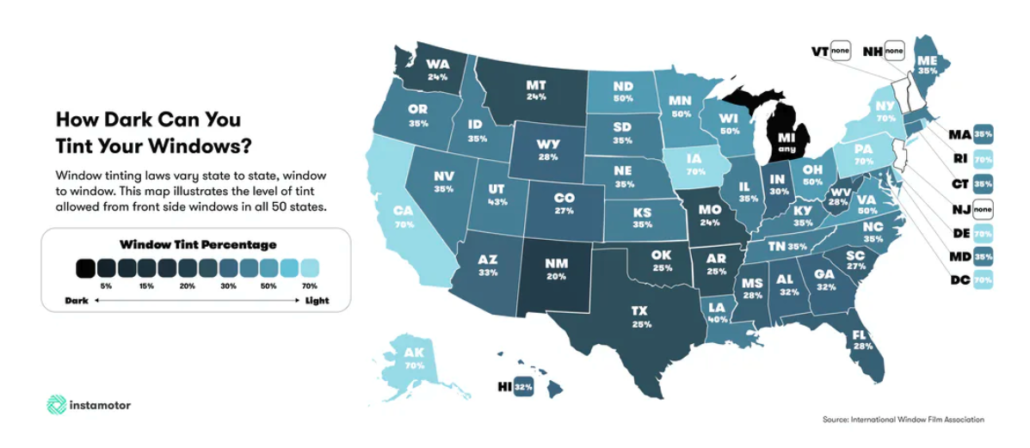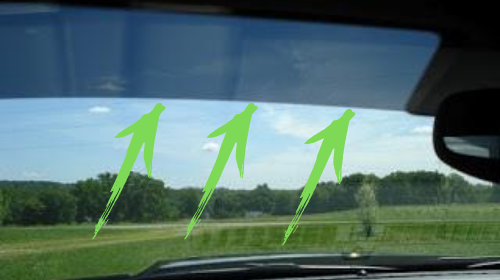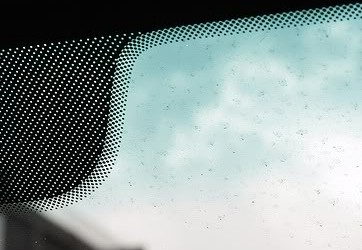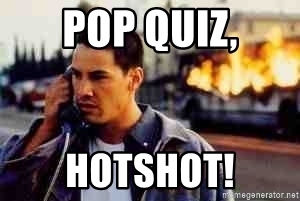The Reason You Got Burned: Your Window Tint
So, you’re a private investigator on a stakeout. It’s a bright, sunny day. You’re in your car in a fixed surveillance position, and your fraudulent Subject somehow becomes aware of you, and now your client is upset. Did you get burned because of your window tint?
The Setup
As a P.I., automotive window tints are a must – it keeps you out of view from neighbors, onlookers, and of course, your Subject. And, of course, it blocks visible light from entering your car’s interior.
But before slapping some on your windows, it’s important to know your state’s laws and general info.
Each state has laws for front, backside, rear windows, windshield, and reflectivity.
When you see data on window tint, you’ll see it categorized by percentage.
Here at Gravitas Investigations, we have a rule of thumb: The lower the percentage, the DARKER the tint, and the less sunlight can come into your car. The higher the percentage, the lighter the tint, and the more sun can come in.
I went ahead and linked to the window tinting laws in all 50 states (click here)Here’s a handy little US map for the level of tint allowed from front side windows:
Let’s take Ohio, Kentucky, and Indiana, for example, the states where I’m licensed.
In Kentucky, the front side window must be 35%. This means you can’t have a tint that allows less than 35% of the rays on your front side window.
It’s 18% on both the rear side and rear back windows. So you can go darker tint there.
The windshield tint allows you to place a strip of tint to the top of the car manufacturer’s “AS-1” line. What is the as1 line?
The AS-1 line extends from the “AS-1” label on most motor vehicle windshields. An actual As1 label is found on the windshield and runs parallel to the top of the windshield or at about 5 inches.
Legal window tint in Ohio is at 50% on front side windows. But any level, even limo tint, is allowed on the rear side and rear back windows. So, we can go crazy there.
Indiana legal window tint is at 30%. Legal tint in Indiana for rear window tint is also 30%. Indiana window tint law also says 30% for side windows.
My two cents: if you can, get your rear side and back windows as dark as possible.
Especially if you have an SUV or minivan, when you add dark tint to the rear windows, they don’t seem to change the look of your car that much. That’s because most factory-made large vehicles come with a high level of rear tint as it is. But if you can match the front and back window tint, I tend to go that route.
It’s visually appealing, and it makes your car blend in well.
My cars also have had the 5” band across the top of the windshield. Though some installers won’t put it there if you have a “frit” band. Those tiny little dots around the edge of your windshield.
I avoid reflective tint because it stands out – it doesn’t blend in too well. I’m not against limo or blacked-out tinting. But if you’re parked for extended periods in your car in a suburban area, it might bring more attention than less.
When it comes to the law, though, I could receive a fine for my tint. I’d be willing to pay that fine. I’ve never been pulled over or cited in my 15 years of driving with an “illegal” tint. I chalk it up to the fact that police officers aren’t looking to cite someone for window tint. It’s a minor offense, and since so many already have it, it’s not worth it for them to stop me.
So, depending on how aggressive your local PD is, it’s up to you how “illegal” you want to tint your windows.
Also, some states allow exemptions. Under some state laws, private investigators can get exemptions on window tinting.
So check your local statutes and revised code for those details.
Quick Tips
Even though you have window tint, the sun can shine, exposing your silhouette.
#1 – Ensure you angle your car to avoid direct sun glare.
I always like to park with the sun at the back of my car if I can and not blasting through the front window. In cold months, the sun is low and can do that to you.
#2 – Find some shade wherever you park.
When I find a stationary spot and park on the street, I usually try to park where there is an overhanging tree. It doubles the effectiveness of your car’s tint and prevents visible light transmission.
#3 – I always have a front window shade to block out any sun coming in the front window and any onlookers.
I get shades that you can pop in and out quickly into your front windshield.
#4 – In a van or larger vehicle, sitting in the rear seats and using window curtains are huge too.
Passersby only pay attention to who is in the driver’s seat and don’t notice people in the back seat. Curtains block out any silhouette. Also, some minivans come stocked with mesh shades that pull up from the sliding door. So you may not even need curtains on the side windows.
#5 – If you’re renting a vehicle and don’t want to use your own to save on mileage, I always ask for an SUV or minivan.
They come stocked with factory-level side windshield tinting and back window shade. The front windows aren’t tinted, but I assume I’ll be sitting in the rear of the vehicle anyways.
Over to you…
What percentage do you have in your windows? Go ahead and assess automotive window tints for all your surveillance vehicles.
Have you ever been given a ticket for illegal window tint?
Comment below. Let me know.
Read this next: Investigating in Italy

